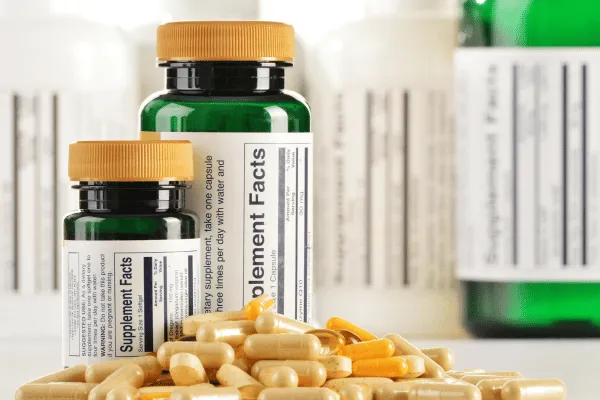Arthritis Treatments
Arthritis treatment primarily aims to alleviate pain, reduce joint inflammation, and improve mobility, ensuring a better quality of life for those affected. Depending on the type and severity of arthritis, treatment options can vary from over-the-counter pain relievers and anti-inflammatory drugs to physical therapy, dietary changes, and even surgical interventions in advanced cases. Recent advancements also explore the potential of biologics and disease-modifying antirheumatic drugs (DMARDs) for certain forms of arthritis. Complementary therapies, like acupuncture and massage, can also offer additional relief for some patients. Regular consultation with a rheumatologist or physician is essential to tailor an effective treatment plan.

AAF Top 3 Supplements for Arthritis
The top three supplements often cited for their potential benefits in managing arthritis symptoms are:
Omega-3 Fatty Acids (Fish Oil):
Omega-3 fatty acids are known for their strong anti-inflammatory properties. They can help reduce joint stiffness and pain, particularly in rheumatoid arthritis. Several studies have shown that fish oil supplements can significantly reduce joint tenderness and stiffness in rheumatoid arthritis patients and may reduce the need for nonsteroidal anti-inflammatory drugs (NSAIDs).
Numerous clinical trials have been conducted over the past three decades to assess the efficacy of omega-3 fatty acids in various rheumatic diseases, including rheumatoid arthritis (RA), systemic lupus erythematosus (SLE), lupus nephritis, and osteoarthritis (OA). In these studies, fish oil supplements have shown significant improvements in multiple clinical outcomes. Specifically, out of 20 clinical trials in RA, 16 showed significant improvements; in SLE and lupus nephritis, 6 out of 9 trials showed significant benefits; and in OA, 3 out of 4 trials demonstrated improvements in at least one clinical parameter.
Glucosamine and Chondroitin:
These are among the most well-known supplements for arthritis. They are often used together and are thought to aid in maintaining and repairing cartilage, the tissue that cushions joints. Some studies suggest that glucosamine and chondroitin can reduce pain and improve function in people with osteoarthritis, though results can be variable.
The Glucosamine/Chondroitin Arthritis Intervention Trial (GAIT), funded by the National Institutes of Health, was designed to determine the effectiveness of glucosamine and chondroitin for osteoarthritis pain. The results showed that for a subset of participants with moderate-to-severe pain, the combination of glucosamine and chondroitin sulfate provided statistically significant pain relief compared to placebo. However, for participants with mild pain, these supplements, either alone or in combination, did not provide significant relief. These findings suggest that the efficacy of glucosamine and chondroitin may depend on the severity of arthritis pain.
Turmeric/Curcumin:
Curcumin, the active ingredient in turmeric, has been widely studied for its anti-inflammatory effects. It may help reduce arthritis pain and inflammation. Some research has shown that it can be as effective as some anti-inflammatory medications, with fewer side effects.
A systematic review and meta-analysis of randomized clinical trials (RCTs) evaluated the efficacy of turmeric extracts and curcumin in treating arthritis symptoms. The analysis included 8 RCTs and found that turmeric/curcumin led to a reduction in pain visual analogue score (PVAS) and improved Western Ontario and McMaster Universities Osteoarthritis Index (WOMAC) scores compared to placebo. These studies provide evidence supporting the efficacy of turmeric extract (about 1000 mg/day of curcumin) in treating arthritis. However, the authors noted that more rigorous and larger studies are needed to confirm these findings due to the limited number of RCTs and their methodological quality.
It's important to note that while these supplements can be helpful, they are not a substitute for medical treatment. Also, they might take several weeks to show effects and may not work for everyone. Always consult with a healthcare provider before starting any new supplement, particularly if you have pre-existing health conditions or are taking other medications.
Understanding Arthritis Through the Numbers
60 million
Close to 60 million adults have been professionally diagnosed with arthritis.
1in 4
One out of every four adults is affected by some form of arthritis.
300,000
A remarkable 300,000 young ones are living with juvenile arthritis.
100+
There are more than 100 conditions related to arthritis
Promoting Interventions That Reduce Arthritis Pain
American Arthritis Foundation recognizes several proven approaches to reduce arthritis symptoms:
Be active. Physical activity—such as walking, bicycling, and swimming—decreases arthritis pain and improves function, mood, and quality of life. Adults with arthritis should move more and sit less throughout the day. Getting at least 150 minutes of moderate-intensity physical activity each week is recommended.
Protect your joints. People can help prevent osteoarthritis by avoiding activities that are more likely to cause joint injuries.
Talk with a doctor. Recommendations from health care providers can motivate people to be physically active and join a self-management education program. Should your arthritis be interfering with your activities of daily living you may be a candidate to receive many new treatments, and learn how to reverse the arthritis condition.
Have a question?
We're Here to Help
By providing my phone number, I agree to receive text messages from the business.


